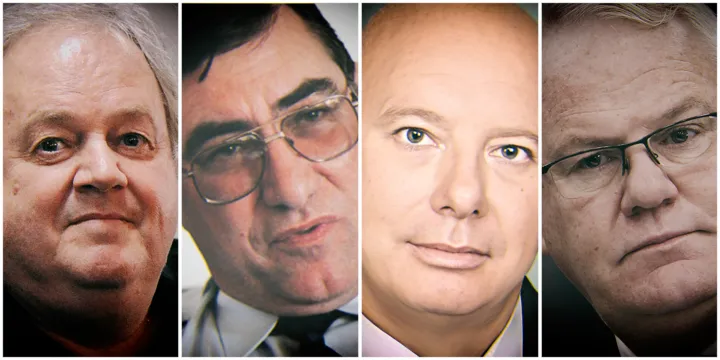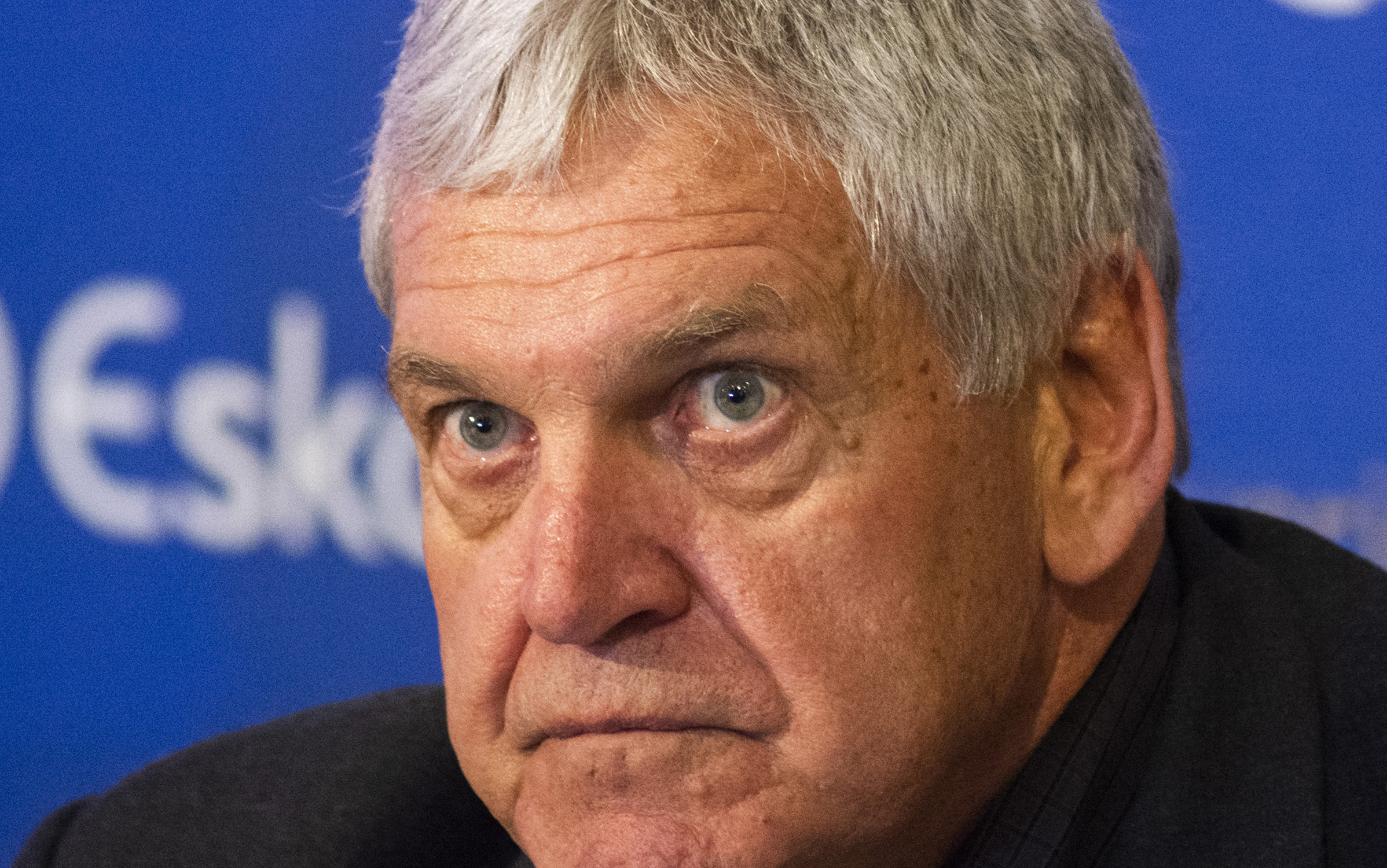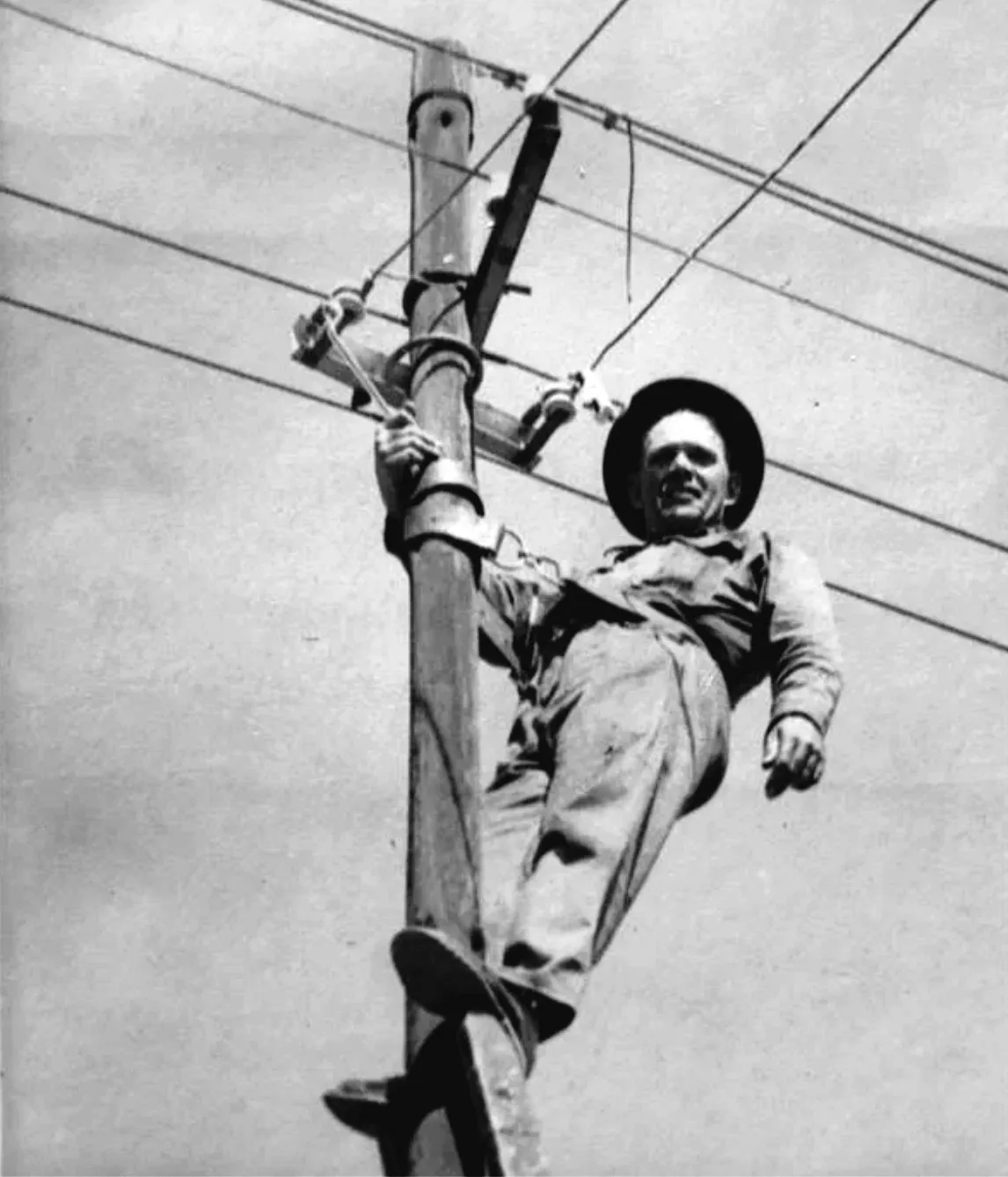ANALYSIS
The broedertwis in Afrikanerdom’s ranks all began at Eskom

One cannot fail to note the cluster of white Afrikaners who seemingly find themselves in the trenches fighting off a criminal siege of the power utility. And some are fighting among themselves too.
Former Eskom chief operating officer Jan Oberholzer has accused journalist Jacques Pauw of “throwing me under the bus” in highlighting the role of an apartheid-era inkabi (assassin) in a private investigation into corruption at the utility.
In a two-and-fro over several weeks and published in the Afrikaans-language Rapport, Pauw, who had been contracted to co-write a book with Oberholzer on Eskom, hit back at his collaborator, inquiring: “Jan, who threw who under the bus?”
“Liegbek. Verraaier. Tweegatjakkals. Rugsteker.” Those are just some of the slights that had been hurled at him, complained Pauw, after Oberholzer’s earlier claims of betrayal by his ex-coauthor.
(Liar. Traitor. Two-faced jackal. Back-stabber – all bog-standard cultural and political insults across humanity.)
One cannot fail to note the heavy cluster of white Afrikaners who seemingly find themselves in the trenches fighting off a criminal siege of Eskom while ANC politicians trudge through quicksand twiddling their thumbs.
The apparent imminent collapse of the electricity grid is an existential threat to democratic South Africa, with a limping economy and embattled masses of poor, hungry, sick, cold and unemployed citizens growing increasingly restless.
It is down to the wire, so to speak.
With the South African Police Service (SAPS) running around in circles and the Hawks apparently trapped in an air pocket, former Eskom CEO André de Ruyter and Business Leadership South Africa took matters into their own hands.
They went private, like the middle classes.

Jan Oberholzer, chief operating officer of Eskom Holdings, on 30 July 2019. (Photo: Waldo Swiegers / Bloomberg via Getty Images)

Kobus Oberholzer, Jan Oberholzer’s father, worked as a linesman for 23 of his 25 years at Eskom. (Photo: Supplied)
The Grey Fox
Dominating headlines since De Ruyter’s unsurprising revelations on national television, an A-list cast of players have stepped into the spotlight on all sides of the battlefront, mind you, with senior ANC MPs and others implicated in sprawling organised criminal networks targeting the state-owned enterprise (SOE).
Everyone has weighed in on or been dragged in – including Minister of Mineral Resources and Energy Gwede Mantashe and Minister of Public Enterprises Pravin Gordhan.
Mantashe maintained De Ruyter’s allegations were “wild and unsubstantiated”, whereas Gordhan urged him to gather intelligence.
The “Grey Fox” is a modern, educated, erudite, handsome, cosmopolitan Afrikaner who prefers chinos and no tie.
“I am a white Afrikaner who had a traditional upbringing during the apartheid years,” he writes of himself in his just-released book Truth to Power: My Three Years Inside Eskom, now circulating illegally on WhatsApp and flooding bookshop shelves.
Born in Pretoria, De Ruyter grew up in Bronkhorstspruit, about 60km east of the capital city. Perhaps it was this cosmopolitan bent that underpinned De Ruyter’s apparent naiveté about the political landscape of the country of his birth and what he described as “the opaque world of the ANC’s internal politics”.
This blind spot aside, De Ruyter recounts that former Reserve Bank governor Tito Mboweni (who was responsible for De Ruyter’s recruitment) understood that “I always spoke plainly about politics, the economy and the direction the country was taking”.
Taking the job would have been his way of disproving “the narrative of an insular, racist Afrikaner stereotype by making a contribution”.
De Ruyter had grown wary of the “braai-side whinging and moaning” where “predominantly white men would drink great wine and eat massive steaks while standing safely on the sidelines and criticising the players on the field”.
One of those players on the field, and he would most certainly be goalkeeper, would have been Gordhan, a member of the South African Communist Party (SACP). He would have been an ally to De Ruyter.
One of the former Eskom boss’s criticisms of the ANC was that it was “stuck in outdated communist ideologies, which embarrasses South Africa among foreign tourists and investors”.
Gordhan would not have been amused.
The gentleman general
Then there is George Fivaz, a platteland Afrikaner and devout Christian, a man who never occupied the inner circles of the broeders (brothers), the clandestine Broederbond society whose DNA was replicated in Afrikaner nationalist politics as its influence spread far and wide after its establishment in 1918. Bultfontein, in the Free State, is where it all began for Fivaz.
Nelson Mandela trusted Fivaz, who was one of the good guys, as the country’s first National Commissioner of Police in 1995. Reconciliation and all that.
Mandela, during 27 years behind bars, took time to understand the histories and complexities of the people who feared and hunted him; who in fact wanted him dead but who jailed him instead.
Mandela also had allies like SACP advocate Bram Fischer, anti-apartheid clergyman Dr Beyers Naudé, as well as poets like Ingrid Jonker.
He knew not all Afrikaner eggs were rotten.
Writing about Fivaz after his appointment, author Mark Gevisser noted: “Perhaps, compared to his primordial predecessors, Fivaz is open and accessible.
“He may wear a suit and a tie that is daring for Pretoria, rather than military drag, and he may choose the title ‘commissioner’ rather than ‘general’, but he is a policeman through and through with all the attendant notions of duty and service.”
Fivaz now finds himself in the lucrative private security industry, which is where he intersected with De Ruyter.
The power and the glory
When the 65-year-old Jan Oberholzer speaks of himself, it is as an “Eskom man in marrow and bone”; “’n Eskomiet” [an Eskomite] who spent 31 years at the utility.
His father, Kobus, worked as a linesman for 23 of his 25 years at Eskom and was one of many who erected wooden pylons in rural areas, electrifying small dorps and farms.
There is a sepia photograph of Kobus wearing a wide-brimmed hat and strapped into a harness at the top of one such pole.
During school holidays and at weekends, young Jan would accompany his father, where he learnt, he says, “the language of electricity” and the “proud culture of Eskom”.
Oberholzer gained his engineering degree with an Eskom bursary.
He, like many others, is steeped in a nostalgia about the glory years of Escom (the Electricity Supply Commission, as it was known at first) – the pride of nationalist Afrikaners and built exactly 100 years ago.
It was understood as one of the greatest achievements for a “volk” once regarded as “poor and backward”.
Writing in his 2012 book Poor White (Tafelberg), scholar Edward-John Bottomley noted that “no less than a century ago, the Afrikaners were known for their poverty, as failed farmers and backyard dwellers.
“By 1924 at least a quarter fell into the poor white category and by 1930, as the Great Depression started to take its toll, about 300 000, one-third of all Afrikaners, were ‘absolutely indigent’.”
The author notes that this is “an astounding number” and that, “less than a century ago, the Afrikaners were not known for apartheid or white privilege, their comfortable suburban houses with swimming pools, security alarms and potato salads/Sunday drives”.
It was SOEs like Eskom, SAA, Armscor and Transnet that propelled some Afrikaners to new economic and political heights.
Pauw taunted Oberholzer as only one Afrikaner can another, saying the former COO was deluded if he had thought Pauw was writing his biography and did Oberholzer “really think anyone is interested in the ‘Eskom-house’ in which he grew up?”
Meow!
Hearts of darkness
Jacques Pauw, journalist and cofounder, with Max du Preez, of the independent Vrye Weekblad, has written from inside the belly of the apartheid beast and has published several acclaimed books, including Into the Heart of Darkness and Dances with Devils.
The man has seen it all, rubbed up close to hideous underbellies in South Africa, Sierra Leone, Rwanda and Sudan. His The President’s Keepers, a book as much about Pauw as former president Jacob Zuma’s patronage network, was a mega bestseller when it hit the shelves in 2017.
Pauw was born in Pretoria to “die-hard Afrikaner parents”, as Angella Johnson wrote for the Mail & Guardian in 1996. His grandmother was born in a British concentration camp and his father was a headmaster and a member of the Broederbond.
“Although he considered himself a liberal during his youth (he was a member of the Progressive Federal Party) Pauw never thought of the ANC as anything other than terrorist until he helped found the newspaper Vrye Weekblad in 1988 and revealed the existence of death squads,” wrote Johnson.
Pauw is quoted as saying: “I started meeting activists from the United Democratic Front and gradually my eyes were opened to the truth.”
Prior to that, he confessed he had considered the ANC “an irrelevant evil”.
“I believed the propaganda that they were communist devils.”
There it is again … the big C.
Johnson writes: “He even did his bit for apartheid: first as a conscript in the army, where he worked in the propaganda unit churning out reports about how the South African army was thrashing Renamo; then as a reporter on Rapport.”
Pauw reminisced: “I remember one particular story when I wrote about the killing of Jeanette and Katryn Schoon by a parcel bomb sent by Craig Williamson.
“General Johan Coetzee, who was police commissioner, told me it had been caused by an internal power struggle within the ANC and I wrote a story saying that,” said Pauw.
Johnson also noted that one of the most “moving” moments in Pauw’s two-hour 1990s television documentary on apartheid mass killer Eugene de Kock was when Pauw faced the camera “and confronted his own apartheid ghost: the role he played in the murder of human rights lawyer Bheki Mlangeni”.
“Hardly a day goes by when I’m not haunted by the fact that I did not believe the bomb existed and therefore forgot to pass on a warning, to someone I knew well,” said Pauw. “I keep thinking that just a five-minute phone call could have prevented it happening.”
Pauw has been around and seen it all, which is why he stirred up a hornet’s nest when he went to News24 claiming that intelligence reports that Fivaz had been sending to De Ruyter, and on which he relied to make his allegations in the television interview, were “effectively worthless” and contained “no facts”.
Even worse, he also pointed out that the lead investigator, Tony Oosthuizen, was a former apartheid assassin, an inkabi, who murdered, among many other people, two deaf children, Amina and Ridwan Chand.
The children were killed during a raid in April 1990 on the home of the Chand family in Sikwane, Botswana.
“We didn’t know” came echoing through the crags.
Drol in die drinkwater
The inclusion of Oosthuizen in the Fivaz investigation, as well as Oberholzer, De Ruyter and even Fivaz’s apparent ignorance of Oosthuizen’s diabolical past, was something Pauw felt strongly he needed to expose.
This led to the acrimonious to-ing and fro-ing between Oberholzer and Pauw in the Afrikaans press.
The point is, there is enough evidence indicating large-scale, prolonged sabotage and criminality at Eskom and big cheeses in the ANC have been aware of this for some time.
Oosthuizen, the drol in die drinkwater [turd in the drinking water], is a dead ringer for a creepy Jeff Bezos, eyebrowless and hairless like a pink mole with dead fish eyes.
He is one of those ghouls, those soulless relics from apartheid’s sordid extrajudicial murdering past, who lives among us and side by side with the new death squads – the cheap izinkabi who roam the political landscape, taking out perceived enemies in the governing party and corruption whistle-blowers. Disrupting democracy because it holds to account.
Enter the general
As reported in News24, retired former KwaZulu-Natal head of the Hawks General Johan Booysen joined the fray later when it emerged that Minister of Police Bheki Cele, as well as National Commissioner Fannie Masemola, had head-hunted him to head a two-year probe into Eskom.
When no contract had been forthcoming, Booysen, after he had been “ghosted”, walked away. He had arranged to be away from his current job of head of investigations at Fidelity Security Services.
Ironically, Booysen grew up in the industrial city of Vanderbijlpark, modelled on the steelworks Iscor, which started operating in 1947. It was another display of Afrikaner self-sufficiency.
The suburb was named after Dr Hendrik Johannes van der Bijl, the post-war Afrikaner industrialist who was the first Eskom chair.
Booysen joined the police in 1976, the year Soweto exploded, and it took 35 years for him to work his way in 2010 to the top job in the violent and crime-ridden KwaZulu-Natal. He is regarded as one of the country’s most experienced investigators.
Keeping the lights on
Most modern Afrikaners today are detribalised and many are flourishing in the 21st-century capitalist economy. Here and there there are die-hard enclaves of white supremacy, but they are not key players.
Keeping the lights on is imperative – for everyone.
Though Eskom might linger like the smell of some familiar old perfume for some of these men brought up with the glories of nationalism, it is a crumbling behemoth that is now making the country ill.
And they know it.
For years Eskom and other SOEs built by the apartheid state provided steady employment for generations of white Afrikaans-speakers. Trade union Solidarity has charged that the utility is about to retrench about 500 white employees, a claim Eskom has debunked.
Leading the assault on the SOE is the criminal mafia and cartels that have infiltrated the ruling party and that thread their way like a poisoned filament through all levels of society.
There are old apartheid criminals footloose and fancy-free in the world who know the ropes, and they too might enjoy a grid collapse, confirming their old racist stereotypes and plunging the country into chaos.
With this scaffolding holding the Afrikaner men at the centre and on the periphery of this drama, the story is far from over.
One thing for sure is that these ouens are sticking to their guns. They always do. Literally.
Some might be dialling in from an “unknown” destination abroad or from Charlotte in the US, as Oberholzer did for his interview, but it is Eskom that beats in their hearts, they say, albeit faintly now. DM
This story first appeared in our weekly Daily Maverick 168 newspaper, which is available countrywide for R29.




















 Become an Insider
Become an Insider
Interesting take, but why did you leave out Pauw’s false reporting in the Daily Maverick?
Also, why would Oosthuizen’s apartheid past necessarily obviate his investigative abilities?
Two very valid comments. Paauw’s false reporting certainly dented my faith in his reliability as a reporter.
and Paauw’s little “display” at the waterfront restaurant did him no favours either.
When Pauw discredited the messenger he discredited the message, or at least gave the ANC the opportunity to do so. So they are in full distraction mode concentrating on Oosthuizen, Fivaz, and De Ruyter’s alleged breech of contract, rather than the report’s content which they ignore. Giving comfort never has a good outcome.
Money causes greed,greed causes murder,the poor and the middle class suffer,story of humaity
“apartheid assassin Tony Oosthuizen”
If Oosthuizen was indeed an assassin as claimed, then why was he never indicted or sentenced? Is it not libel / defamation to call him that?
The TRC volumes are publicly available
Ms Thamm fails to realise that information stands on its merits, not its origins.
Let me understand, how is this solving the problem of diminishing power? or are we going to argue that it is speculation that the Titanic “hit” an Iceberg while in fact it did, and is busy sinking. This is serious navel-gazing at a time we need to concentrate on getting the Women and Children to the life boats, and stop the decline of our power production and save the South African economy, so to speak.
The term “Broedertwis” was originally about the de Wet brothers, 5 generations ago. It cropped up from time to time to summarize no-holds-barred fights for ascendency involving Sanlam, Rembrandt, Fedmyn etc in the seventies and was trotted out again whenTreurnicht split the monolithic NP to lead his verkrampte faction away from the verligtes.
These were all titanic struggles, and had little to do with Escom, and certainly NOTHING to do with Eskom.
In fact, one can barely feel any reverberations from Pauw’s back-out here. Had Jacques maybe been over-indulging at the Waterfront again?
Anyway, Marianne, I feel let down by your content, after being drawn by DM’s head-line. Is there to be a Part II ?
The lady seems to have a chip on her shoulder.
Maybe she has a chip on both shoulders and thinks that she is well balanced.
I wish the media would stop this stereotype with “Afrikaners”. Afrikaans is my home language but language is all I have in common with the stereotype perpetuated.
there is no more a major Afrikaner group than there is a thing such as Zulus, Xhosas or English. Was Breyten Breytenbach an Afrikaner? Fewer than 1 in 50 Afrikaans people I know fit the stereotype that journalists want to conjure when they use the label.
Afrikaans is purely a communication medium, no more no less.